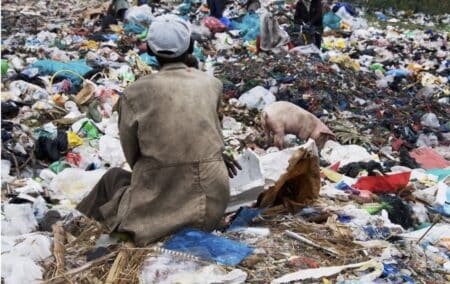There are two ways to read that question and in both cases the answer is yes. In both cases the implications for South Africa run deep.
Eliminating poverty remains elusive. Eliminating chronic subsistence-level poverty just keeps getting easier.
Many people in successful economies will experience poverty but, like an acute illness, it will normally arrive suddenly and be short-lived. When people lose their jobs, and exhaust their savings before they find the next one, they experience poverty.
Chronic poverty persists. South Africa’s massive backlog of youth unemployment tells us that a majority of our young adults face a life-time of chronic poverty. Such outcomes have become extremely rare in other regions.
Throughout history, most humans lived subsistence existences with children, families and communities routinely perishing. Survival was challenged by floods, droughts, pestilence, plagues and predators – beasts and other humans. Today’s world is very different.
Barely a generation ago, Nobel laureate development economist Amartya Sen said, ‘Famines are easy to prevent if there is a serious effort to do so, and a democratic government, facing elections and criticisms from opposition parties and independent newspapers, cannot help but make such an effort.’
‘Famines’, in his quote, can today be replaced with ‘large clusters of chronic poverty’. Thus, the world has advanced to the point where pervasive poverty requires government support in the sense that government must create the conditions for it to exist.
While the pandemic has caused serious setbacks, long-term trends point to chronic poverty becoming an endangered species. Poverty had always been the norm before declining to just under 40% of the global population by 1990, and less than 10% as 2020 began. What drives this persistent decline are continual advances in science and commerce.
The pandemic reinforced how difficult it is to hold politicians accountable. When it comes to protecting and improving lives and livelihoods, at critical junctures and more generally, the heavy lifting is done by science and commerce.
Highly efficacious vaccines were developed in record time and already nearly five billion doses have been produced and administered. Governments stumbled, only infrequently finding their stride.
South Africa’s 1990s political transition enthused expectations of broad prosperity. Normally, forecasts are tricky, yet we can be very nearly certain that fifty years after the transition a majority of black South Africans will be poor. Most of them will be chronically poor.
Rapidly declining
How can we be nearly certain of such an outcome? The world’s poverty has been rapidly declining because so many developing countries have deeply integrated into global supply chains. This makes the productivity of their workers their primary growth engine. Our policy makers reject this proven growth blueprint in favour of policies prioritising redistribution.
Even in the absence of corruption, prioritising redistribution ahead of growth would have left a huge portion of South Africans marginalised. South Africans want jobs but to gainfully employ nearly everyone who wants a job, the economy must either be much larger or we must adopt the value-added exporting model common to today’s successful emerging economies.
Forecasters can’t see our economy sustaining 1% growth in per capita income. Our ruling elites would have us believe the problem is a lack of investment capital. Yet the world has never been more awash with investment capital looking to be prudently employed.
Our economy is starved for what economists call ‘market access’. Under apartheid, blacks were prohibited from selling all but low-skilled services to the white market which was much more affluent. Our post-1994 leaders have sought to reverse that through BEE-type regulations. This was always destined to narrowly benefit members of the ANC and their alliance partners at the expense of the majority. It was always going to end badly.
The core problem is that the beneficiaries of apartheid who remain, and the beneficiaries of BEE and the like, don’t generate nearly enough spending to employ the many millions who have been sidelined. Focusing on redistribution will leave most young South Africans stranded.
Excessive reliance on debt by households and government means much of the spending which should be fuelling future growth has already been consumed. That much of this debt is very expensive further erodes prospects.
Our economic policies are inversions of those common to high-growth developing economies. Redistribution-focused policies, alongside routine government missteps, undermine our competitiveness thus undercutting our value-added exporting potential. Meanwhile, disparate voices conjure up countless reasons why we can’t compete in this sector or that. Our entrepreneurs are deterred from serving niche international markets, yet this is our necessary growth path.
High-flying developing countries across Asia and elsewhere are attractive production centres for global companies seeking to expand their output. In addition to bringing capital and hiring locals, such companies bring much general management expertise and specific industry knowledge. In effect, they create economic and learning hubs which breed supporting companies. Importantly, their customers are affluent and distant. Otherwise the host country’s spending capacity would enforce a quite pedestrian growth rate.
Government-induced famines
Our economic woes cannot be subdued by attracting overseas companies to come to South Africa and compete against local companies to serve our local consumers. Our ruling party’s combination of policies was always going to leave most South Africans chronically poor. Proposed basic income grants will be needed to avoid what amounts to ongoing government-induced famines.
It is quite possible to rapidly grow the economy and employment. The obstacles are of our own making; they are political. The country simply needs to adopt those policies common to fast-growing countries with low unemployment.
The views of the writer are not necessarily the views of the Daily Friend or the IRR
If you like what you have just read, support the Daily Friend


